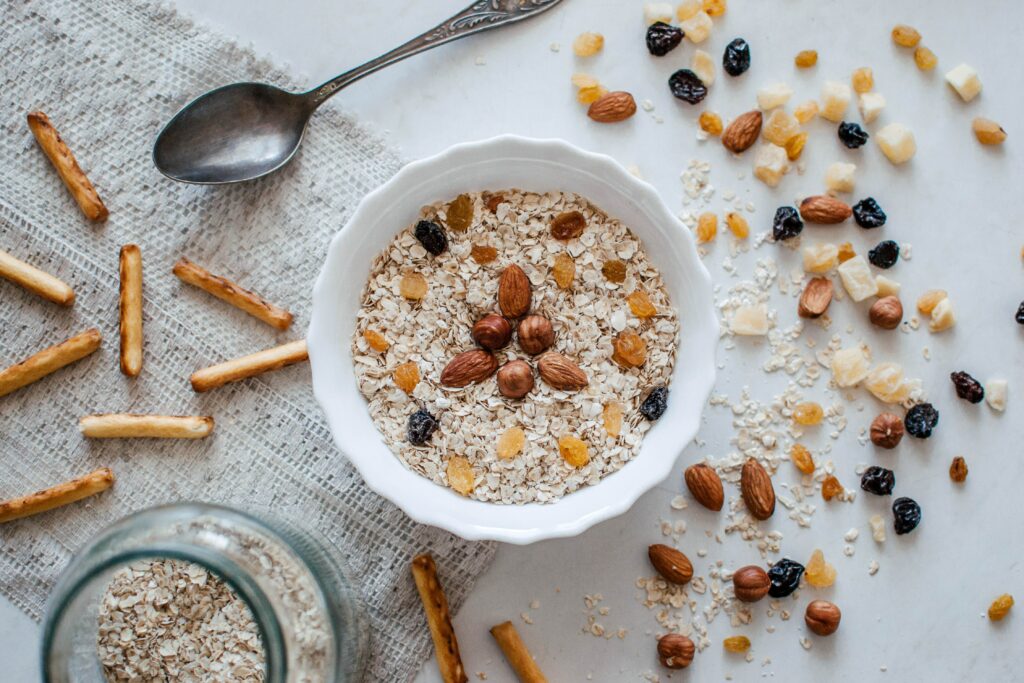By Freya Gascoigne
Whether it’s loading up on kimchi and kefir for gut health, or guzzling down green powder for glowing skin, TikTok has catapulted viral female nutrition fads to an unprecedented level.
With so much information thrown at us, it can be hard to cut through the noise and understand what we should be packing into our diets.
Women’s hormonal sensitivities mean that throughout our reproductive and post-reproductive life spans, our nutritional needs can change.
Hormones are chemical messengers that control various bodily functions, including metabolism, growth, reproduction, and mood.
In the follicular and ovulation phase, Follicle-stimulating hormone (FSH), is secreted, which stimulates the follicles in our ovaries that produce eggs.
The hormone estradiol rises, which helps to suppress stress related hormone cortisol, typically causing a boost in happiness and energy. In this phase, we may be likely to make healthier choices and stick to our usual diets.
However, after ovulation comes the luteal phase. Progesterone begins to rise, boosting cortisol production and potentially causing those dreaded mood swings.
Research from The Journal of Consumer Psychology stated that women are more likely to crave higher calorie foods in the luteal phase, so if you’re reaching for chocolate before your period, this may explain why.
Eating nutritionally balanced meals during our luteal phase can help ease some of the nasty side effects of rising cortisol, but what constitutes nutritionally balanced?
Charlotte Price is a Naturopathic Nutritional Therapist at Eat Nourish Heal, her clinic based in both London and Wiltshire.

As a mother of two teenagers who has worked in the corporate world, Charlotte understands the impact a busy lifestyle can have on stress and overall health.
She said: “I focus on supporting and stimulating a client’s own body’s natural healing abilities, emphasizing a holistic approach to health and wellness.
“I aim to identify and address the underlying causes of illness or imbalance, rather than simply treating symptoms.”
Charlotte’s consultations offer patients a comprehensive assessment of their health, and she develops personalised treatment plans tailored to individual needs.
Often in General Practice, due to time restraints, symptoms related to female health can be addressed in isolation.
Naturopathic nutritionists like Charlotte aim to look at the full picture to identify a common thread that could link various symptoms.
Her treatment approach is also multifaceted: “With the focus on nutrition, I emphasize a healthy, balanced diet and providing individualized dietary recommendations to support specific health conditions, incorporating lifestyle counselling: providing guidance on various aspects of a person’s lifestyle, such as stress management, exercise, sleep, and environmental factors.
“I often work alongside conventional medical practitioners such as GPs and make referrals where necessary; we do not diagnose.”
Charlotte confirmed that nutrition plays a crucial role in regulating hormonal balance, but highlighted that female nutrition is not a ‘one size fits all’ concept.
She said: “It’s important to note that everyone is unique and that as a naturopathic nutritional therapist, you treat the individual, not the symptom.
“We work to understand your specific dietary needs and how to optimize hormonal balance through nutrition.”
Although a personalised approach is crucial if treating a specific health concern, Charlotte helped us break down the key elements of a dietary approach that factors in hormonal health.
1. Macronutrients
Macronutrients are the cornerstone of your diet, as they are the nutrients you eat in the largest quantities. Carbohydrates, proteins, and fats, can influence hormone production and sensitivity. For example, consuming excessive refined carbohydrates and sugars can lead to insulin resistance, a condition where cells become less responsive to the hormone insulin, which regulates blood sugar levels. This can disrupt other hormonal processes in the body. To nail your macronutrients, these are great staples to have in your diet:
Carbohydrates: Including whole grains, fruits, vegetables, and legumes as sources of complex carbohydrates. Choosing whole grain options such as whole wheat, brown rice, quinoa, and oats, which provide fibre, vitamins, and minerals are a good choice.
Proteins: Incorporating lean sources of protein such as poultry, fish, beans, nuts, and tofu, which provide essential amino acids.
Fats: Consuming healthy fats from sources like avocados, nuts, seeds, and olive oil to provide essential fatty acids and fat-soluble vitamins.
2. Micronutrients
Micronutrients are the vitamins and minerals in our diet. Vitamin D is crucial for the production and regulation of various hormones, including insulin, thyroid hormones, and reproductive hormones. Incorporating a variety of colourful fruits and vegetables to ensure a wide array of vitamins, minerals, and phytochemicals – eat the rainbow!
Vitamins: Obtaining a wide range of vitamins, including vitamin A, C, D, E, K, and the B vitamins, through the consumption of fruits, vegetables, whole grains, and fortified foods.Minerals: Including an adequate intake of minerals such as calcium, iron, magnesium, potassium, and zinc, which can be found in sources like dairy products, leafy greens, nuts, seeds, and legumes.
3. Omega-3 Fatty Acids
These healthy fats, found in fish, flaxseeds, and walnuts, have been shown to have anti-inflammatory properties and may enhance hormonal sensitivity. Omega-3 fatty acids can help modulate the production and action of hormones involved in inflammation, such as prostaglandins, and improve insulin sensitivity.
4. Fibre
Fibre from fruits, vegetables, and whole grains, can positively impact hormonal balance. It helps regulate blood sugar levels, promotes a healthy gut microbiome, and supports the excretion of excess hormones through the digestive system. For women who suffer badly from PMS or Pre-Menstrual Dysphoric Disorder, a high fibre plant rich diet can be effective due to the impact on gut health, blood sugar regulation, and the way the body deals with the breakdown products of hormones.
5. Phytoestrogens
Phytoestrogens are a natural compound found in plants and plant-based foods. Certain plant compounds can mimic or modulate the effects of oestrogen in the body, such as soy, flaxseeds, and legumes, and may influence oestrogen levels and hormonal sensitivity. However, the effects of phytoestrogens can vary depending on the individual and their hormonal status.
6. Caloric Intake & Body Weight
Maintaining a healthy body weight through a balanced diet can help regulate hormone production and sensitivity. Excess body fat, particularly abdominal fat, can lead to hormonal imbalances, such as increased insulin resistance and elevated levels of oestrogen which can affect hormonal sensitivity. It’s important to pay attention to portion sizes and practice moderation in order to maintain a healthy energy balance and avoid excessive calorie intake.
7. Gut Health
The gut microbiota, the community of microorganisms residing in our digestive tract, plays a significant role in hormone metabolism and regulation. A healthy gut microbiome supports proper digestion and absorption of nutrients. Yoghurt and kefir are good sources of probiotics that can be easily incorporated into the diet at breakfast time, or as a snack with fruit. Trendy kimchi, kombucha and sourdough are also good sources of probiotics, but are often overpriced. Almonds, bananas, and brussell sprouts are all great ways to manage gut health that don’t come with a hefty price tag.
8. Hydration
Staying hydrated is crucial for various reasons: regulating body temperature, keeping joints lubricated, organ function — the list is endless. Consuming an adequate amount of water and staying hydrated throughout the day is really important to maintain good nutrition, and 2 to 3 litres a day is considered the recommended amount.
9. Limiting Process Foods & Added Sugars
Reducing the consumption of processed foods, sugary snacks, sugary beverages, and foods high in saturated and trans fats.
10. Individual Needs & Preferences
It’s important to consider individual dietary needs, preferences, and any specific health conditions or restrictions. Remember, a nutritionally balanced diet is not about rules or deprivation, but rather about making sustainable and healthy food choices that meet your body’s nutrient requirements.
If you’re interested in addressing your own individual health needs, you can visit Charlotte’s website for more information.














